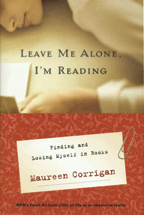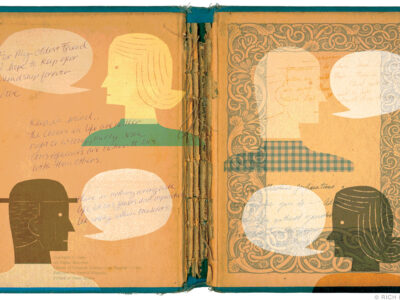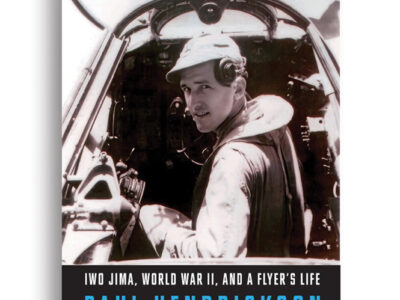When books and life intersect.
By Katie Haegele

LEAVE ME ALONE, I’M READING:
Finding and Losing Myself in Books
By Maureen Corrigan Gr’87. Random House, 2005. $24.95.
Just about everybody enjoys reading something. If not “important” books then fun ones, and if not books at all then magazines or the Sunday paper. So what is it about people who spend all their time with their nose in a book, who prefer to be carried away into someone else’s version of the world than stuck in the world itself? Maureen Corrigan is one such person, a self-proclaimed “obsessive reader” who just wrote a whole book about, well, how much she likes books. But her unusual memoir doesn’t really try to explain what’s made her want to read so much. Instead, she sets out to show us what reading has made of her, how a lifetime of book-love has helped her become the person she is.
These days, she’s a book reviewer for NPR’s Fresh Air and a professor of English at Georgetown University. Before that she was an Irish-Catholic kid growing up in Queens whose mother couldn’t be bothered with books and teased young Maureen that she would grow bumps on her head from reading so much. She writes that one of her earliest literary influences was The Brooklyn Catholic Speller, which introduced new words in essays and poems that also contained no-nonsense moral messages and which tended “to turn one into a paranoid reader.”
She may be breathtakingly well-read, but she’s not a snob. Those underbelly-dwellers Sam Spade and Mickey Spillane; the bleak and batty poems of Stevie Smith; Sydney Carton, the martyr who (literally) loses his head at the end of A Tale of Two Cities—Corrigan loves them all. In fact, it was reading hard-boiled detective novels—not “literary” fiction—that preserved her emotional health while she suffered her way through Penn’s Ph.D. program in English during the late 1970s. After eking out her dissertation, she turned the reading she’d done for fun into an essay for The Village Voice. That, she felt, was her “real” dissertation, and as this book proves, she does indeed sparkle in the informal format.
But this isn’t meant to be a collection of critical essays. It’s a memoir. Sort of. While she doesn’t take us on a chronological mystery tour of her life, she manages to work in biographical details as they intersect with the books she wants to talk about. Most of those fall into a few intriguing categories of her own invention. In one chapter, she makes a case for the existence of “women’s extreme adventure stories.” Male writers have their perfect storms and their Shackletons shackled in ice, but Corrigan argues that the painful slow-burn of courtship experienced by the women in novels by the Brontë sisters and Jane Austen wasn’t much better. After all, to not get a husband would result in a kind of social death. Now that’s extreme.
To hear Corrigan tell it, sometimes a book feels like it was written just for you, the way love songs on the jukebox always speak directly to your own romantic mess-ups. And when she found herself at the heartbreak hotel of graduate programs, Kingsley Amis was the DJ who saved her life.
When she first got to Penn, Corrigan was pleased as punch to have gotten there: through sheer love of reading she’d hoisted herself outta the neighborhood and into the Ivy League. But it wasn’t long before she hated the overcompensatingly pompous people she met in her program. “I insist that Penn, in the years I was there, was uniquely awful because it was so nervously self-conscious about its own institutional status,” she writes. Enter Amis’ academic farce Lucky Jim, in which a lower-middle-class guy ends up as a junior lecturer at a shabby university where everyone “tries extra hard to mimic elite forms of behavior because it’s not quite a first-rate place.” (Ouch.) Writing about how much she loves that book provides a unique entrée to her real life.
Unfortunately, her approach doesn’t always make this much sense. The problem with unconventional autobiographies is that it’s no small feat to blend a personal narrative with something else. At least Shoba Narayan, in her popular nonfiction Monsoon Diary: A Memoir With Recipes, could just stick the recipes at the end of each passage. When Corrigan’s reading life and her life-life come together smoothly, her book is a delightful success. When they don’t, it reads less like a memoir and more like a collection of book reviews preceded by a lot of self-centered throat-clearing.
In one of her more personal riffs, Corrigan describes the experience of traveling to China with her husband and several other couples to adopt their baby daughter. She recalls being unable to concentrate on reading during that exciting and scary time, but, creepily enough, the one thing that did hold her attention was The Unicorn’s Secret, Steve Levy’s nonfiction book about convicted murderer Ira Einhorn C’61 [“Alumni Profiles,” October 1997, January/February 2003]. She was aware that a book about the countercultural and academic Svengali who murdered his girlfriend and stuffed her in a trunk was a nasty thing to have in a baby’s room (“near the crib!”), but she couldn’t help it. In retrospect, she interprets her inappropriate choice of reading material as a way of keeping the baby experience at arm’s length, to steel herself in case the years of failed fertility treatments and adoption rigamarole ended in more disappointment. Then again, she writes, “Perhaps there are some life experiences that are simply beyond books.” Somehow, I don’t think she really believes that. Read her loving elegy of her outer-borough childhood, which dovetails beautifully into an excerpt from Pete Hamill’s New York-based memoir A Drinking Life, and you probably won’t either.
For what it’s worth, my own life intersected with my reading of Corrigan’s book. I started Leave Me Alone on a redeye flight to Dublin, Ireland, where I was traveling to begin graduate school, and finished it during the first few days I was there. Corrigan’s bright, straightforward, and very American voice was a surprising comfort to me just then. Her book gave me a new way to think about reading—not as an escape from “the real world,” but as a complement to lived experience. It takes a pretty imaginative reader, and writer, to come up with something that original.
Katie Haegele C’98 is pursuing a master’s degree in modern English literature at University College Dublin.




